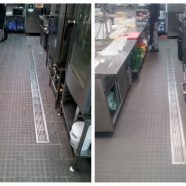Epoxy Grout vs Cement Grout: Which is best for my Bathroom?
When you’re planning a renovation or restoration project involving tiles — whether it’s refreshing your bathroom, regrouting your kitchen splashback, or investing in a complete tile and grout restoration — one of the biggest decisions is choosing the right type of grout. The material you choose can make a big difference to how your tiled areas look, feel, clean and last over time. As tile and grout restoration professionals, we often get asked the same question: Should I use epoxy grout or cement grout? Here is some information to help with your decision on which type of grout will work for you. Cement Grout: Cement grout has been the industry standard for decades, however this doesn’t mean it is the best option. It’s a powder-based mixture (usually cement, sand, and water) that is applied between tiles and then cured to form a solid joint. Shower Re-grout Using Cement-based Grout Benefits of Cement Grout: Cost-effective: Cement grout is cheaper to buy and install than epoxy grout, making it popular for large areas or projects with tighter budgets. Easy to apply: Many tilers are very familiar with cement grout, so application is straightforward. Variety of colours: Available in a wide range of shades to match or contrast your tiles. Can apply sealant: Grout sealant can be applied on top of the cement grout to seal in the newness and make cleaning easier. Things to Consider: Porous: Cement grout naturally absorbs moisture and stains. Without sealing, it can quickly look dirty, especially in showers and kitchens. Maintenance: Regular deep-cleaning with tough chemicals and periodic resealing are required to keep it in good condition. Durability: While suitable for most domestic uses, it is prone to cracking, chipping, and discolouration in a shorter amount of time, especially if not sealed. Cement grout is a good choice if you’re looking for an affordable, familiar option and don’t mind the extra upkeep. Book a Re-Grout with Cement Grout Epoxy Grout: Epoxy grout is made from epoxy resins and hardener, and sometimes also a filler powder. This creates a dense, non-porous material that is far more resistant than traditional cement grout. Due to its durability its maintenance and restoration needs are much less thus reducing waste and is a better long-term alternative to cement based grout. Shower Re-grout Using Epoxy Grout Benefits of Epoxy Grout: Stain and water resistant: Perfect for wet areas such as showers, laundries and kitchens. Spills and splashes won’t penetrate. Durable: Highly resistant to cracking, crumbling, and wear, making it ideal for high-traffic areas. Low maintenance: No sealing required. Once cured, it’s easy to clean and stays looking new for longer. Colour longevity: Resists fading and keeps its appearance even in harsh conditions. Things to Consider: Higher cost: Epoxy grout is more expensive both in product and installation. Specialist application: It requires experience and skill to apply correctly. Poor installation can leave a sticky residue (also known as ‘grout haze’) that’s difficult to remove. Epoxy grout is ideal if you want maximum durability and minimal maintenance, especially in areas where hygiene, water resistance, and long-term appearance are your top priority. Book a Re-Grout with Epoxy Grout Which One Is Right for You? The choice really comes down to your priorities: On a budget or updating a low-moisture area? Cement grout may suit you best, provided you’re prepared for ongoing maintenance. We highly recommend you seal this grout for longevity in appearance and lifespan. Want a “fit-and-forget” solution with maximum durability? Epoxy grout is worth the investment, especially in showers, kitchens, and other high-use or wet areas. At GroutPro, we use both cement and...
Read MoreGrout Repair vs Grout Replacement
Making the Right Choice for Your Tiles Tiles are the cornerstone of a beautiful home, bringing charm and functionality to spaces. But over time, the grout that holds them together can start showing signs of wear and tear. The question is: do you repair the grout, or is it time for a complete replacement? Let’s delve into the world of grout repair vs. replacement and help you make an informed decision. Understanding the Grout Trouble Signs Grout serves as more than just a filler between tiles; it ensures stability, prevents water damage, and enhances the aesthetics of your space. Before deciding whether to repair or replace, let’s decipher the signs that something might be amiss: Grout Repair Indicators Minor Cracks: Hairline cracks on the grout surface can often be repaired. Discoloration: Stains and discolouration might be addressed through professional cleaning and ColourSealing. Localised Damage: If only specific areas show wear, repairing those portions might be sufficient. Grout Replacement Situations Severe Damage: Extensive cracks, crumbling, and missing sections signal the need for replacement. Mould and Mildew: Deep-seated mould or mildew growth that resists cleaning indicates a replacement is necessary. Loose or Missing Tiles: If tiles are loose due to grout or glue deterioration, replacement of grout is essential to maintain structural integrity, this may include the replacement of some tiles as well. Can You DIY? While small-scale grout repairs can be DIY projects, extensive issues are best left to professionals. DIY repairs might mask underlying problems, causing more harm and expense in the long run. Professional assessment ensures the right solution is implemented saving you time, money and stress. How GroutPro Can Help GroutPro specialises in transforming tiles and grout to their former glory. Whether it’s a repair or replacement, our experts analyse the situation and tailor a solution: Some services we may recommend: Re-grouting: This can include the Removal of Old Grout, Hygienic Clean of Grout lines, Mould Treatment if Necessary, Grout Colour of Your Choice, New Grout Installation, and Grout and Tile Sealing. Epoxy Re-Grouting Which can include removal of the old, damaged, crumbling grout, a Hygiene Deep clean of grout lines to ensure no left over debris or bacteria, Mould treatment of the grout lines if necessary, and your choice of Epoxy Grout colour in the installation of new grout. Epoxy is one of our most popular products as it is a resin based grout making it incredibly easy to clean and is also completely stain-proof. Silicone Seal Replacement: This GroutPro service can include the Removal of Silicone, a Complete Hygiene Clean of the area, Mould Treatment if Necessary, Silicone Colour of Your Choice, and Application of brand new Silicone. ColourSeal Application ColourSeal can not-only seal your grout, but it can also conceal minor imperfections in your grout including small hairline fractures and pitting. ColourSeal is available in over 80 different colours which you can choose from. We will apply this coloured sealant to your grout lines to protect from future stains and aid in fixing minor grout damage. Making the Right Choice Choosing between grout repair and replacement depends on the extent of damage and the expertise required. While DIY repairs can work for minor issues, significant damage demands professional attention to ensure long-lasting results. At GroutPro, we’re committed to elevating your tile experience. Let our specialists assess your situation and recommend the best course of action. Whether it’s a repair or a replacement, count on GroutPro to transform your space and bring back its brilliance. Remember, every tile deserves the best care. Reach out to GroutPro for a professional evaluation and a tailored solution that...
Read MoreReplacing Grout in Commercial Kitchens
The Challenge with Commercial Tiles Tiles in commercial kitchens, restaurants or cafés go through a lot. Not only the constant foot traffic of customers coming and going at all hours of the day or night, or chefs constantly on the move in the kitchen, but also the stains and wears that come from spills and cleaning. Most tiles are laid with conventional cement and sand based grout, and while this may provide the cheap and easy alternative, conventional sanded grout is very porous which allows it to absorb both solids and liquids very easily causing staining, but also providing a perfect haven for bacteria to thrive. One of the major health risks in commercial kitchens is oleic acid which is produced when frying food, and this acid together with oils and fats can flow through the grout and into cavities under the tiles where is accumulates and damages the tile adhesive and the floor they are laid on. Mopping or hosing down will only remove soil-age and bacteria from the surface but what’s absorbed below the surface remains creating a very unhygienic food source for bacteria. Over time these contaminants together with harsh cleaning products will weaken the grout, tile adhesive and substrate which will begin to fail allowing grout to fall out and tiles to become detached from the substrate. Your floors not only start to show stains, the integrity and strength of your tiled floors are compromised due to grout that just can’t cut it. How can I make commercial kitchen tiled floors last? The secret to tiled floors that last is Epoxy grout. Epoxy grout is a two part plastic resin mixed with a filler which is impervious to penetrating staining liquids and solids, and better suited for harsh cleaning products. Epoxy grout offers greater bond strength and chemical resistance than cement grout providing a surface that can be easily cleaned with conventional methods. Many fast food outlets specify epoxy grout for their floors for both maintenance cleaning and hygiene reasons. This means that not only will your floors be more hygienic and last longer, it means that you can thoroughly clean your floors more effectively without having to worry about causing damage with harsh chemicals. Epoxy Grout is your solution to longer lasting floors Epoxy grout is used in larger tiled surface areas normally in commercial applications. Business owners use Epoxy grout in public tiled areas with high levels of foot traffic because it’s durable, and easy to clean. Even home owners are starting to see the benefits of using Epoxy grout in tiled areas, particularly in showers. It is important to select the correct grade of epoxy grout as they are not all the same. Your GroutPro specialist can explain the differences and offer a suitable product for your application. GroutPro offers grout repair and re-grouting services Our GroutPro specialists were called out to a commercial kitchen at Springwood Country Club – Bathurst, to remove and replace 80 square metres of damaged grout and perform repairs to damages substrate and replace detached tiles. As the work was in a busy operational kitchen, our teams were working outside operating hours to ensure as little interruption to their business as possible. Check out the photos below to see the results of how it came out. If you are interested in restoring the tiles and grout in your commercial kitchen or tiled area, contact us today or find a GroutPro specialist near you. A full kitchen clean, ColourSeal and silicone replacement, photo's show the before and after of the services The worst offending grout of the...
Read More







